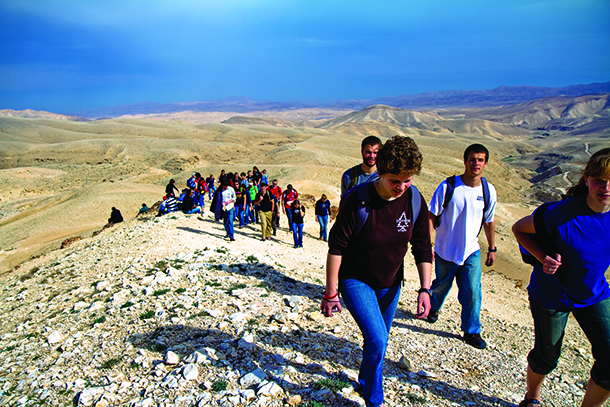After conducting interviews with current students in the Middle East in February 2012, reporter Andrew Jenner ’04 contacted alumni from earlier EMU-sponsored trips to the region.
In comparing the responses of current and former students, Jenner found that the “lessons” assimilated during this cross-cultural do deeply influence them, likely for rest of their lives. Of course, the students also bring home innumerable photographs, souvenirs and memories.
“As I reflect back on my experiences, all of my senses are affected,” says Ellie Barnhart ’11, who studied in the Middle East in 2010.
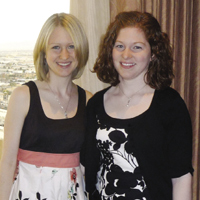
She remembers the taste of Arabic coffee and fresh pita in Nazareth, the fragrant marketplace in Jerusalem’s Old City, and the smell of the sea from a ferry on the Mediterranean. She hears the voices speaking in Arabic, English, Hebrew, Italian, and Greek; she recalls the cold, salty water of the Dead Sea on her skin and the smoothness of freshly polished olive wood in Palestine. She can close her eyes and remember the sunset on Mt. Sinai, and Jews praying at the Western Wall while Muslims knelt for prayer just above them, atop the Temple Mount.
“The experiences from the trip continue to impact me, whether I am reading my Bible, listening to the news, or even just talking with a friend over coffee,” says Barnhart, now working as a nurse in Salem, Oregon. “Sometimes it is in the most unexpected moments when one of my senses is triggered, and I am taken back to the Middle East.”
Thoughts and reflections collected from a dozen alumni of the Middle East cross-cultural over the decades reveal six major ways in which the trip influenced their lives.
1. Gaining better understanding of the Bible and insights into its relevance.
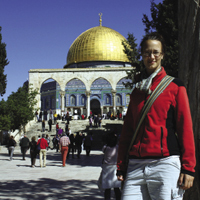
“Being in the Middle East made reading Scripture much more real,” says Ruth Ellen Dandurand ’10. “Now when I read the Bible, I not only have a picture in my mind of what and where it took place but also a deeper understanding of all the realities of each lesson. Each detail the Lord had written in his book was intentional to serve a certain purpose, to give a certain picture that sometimes is only possible to see clearly in the right circumstances of place, heart, mind, and culture.”
Eric Trinka ’07says the trip gave him exciting opportunities to “re-examine the Word of God in its geographic and historical contexts.” Trinka, who relinquished his job as a middle school geography teacher in Harrisonburg (Va.) to enroll at Eastern Mennonite Seminary in the fall of 2012, has returned to Israel and Palestine four times with a Virginia Mennonite Missions program.

In that role, Trinka worked to create a “curriculum for participants interested in studying the life of Jesus in the context of the first century while applying what they learn to the modern Palestinian-Israeli conflict.”
“Each of these opportunities has exposed me to a wealth of information and experiences that have continued to nudge me in the direction of New Testament studies and a career in place-based, Biblical education,” he says.
2. Experiencing challenges to one’s faith.

An epiphany struck Rus Pyle ’03 as he lagged behind the rest of his group on Mt. Zion one day. “I came away with an understanding … that faith is something real and special and it can be crucial and central to our well-being. The power of belief can heal us in ways where other avenues may fall short.”
Bess Moser ’08 had the opposite reaction: “I was lost in the turmoil of the Holy Land…. Someone had flipped the light switch; there was darkness all around. Rage, anger, and confusion had consumed me….
“I had seen acres and acres of olive tree stumps and could hardly restrain myself from screaming. I had shed countless tears. I had stood on a hillside looking at a settlement and understood in my own heart what drives people to violence and deep hatred. I felt the weight of the world and its suffering on my shoulders.”
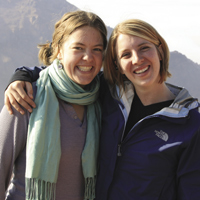
Moser says she wonders if she will regain the sense of hope and faith she lost as a result of what she saw in the Middle East.
Ruth Ellen Dandurand ’10 initially experienced a similar loss of faith, wondering if prayer had any power to make things better. “The Jews and Muslims and Arab Christians there pray! They pray all the time. You can see them praying when they’re walking down the street or kneeling on the floor in their shops or with their families .… But being there and experiencing just a small taste of what they have to live with all the time – so little has changed.”
After learning about the mistrust and violence that linger in the Middle East despite so many prayers, Dandurand was left with “an almost complete disbelief in the power of prayer.”
“Thankfully God has since healed that part of my faith and I have no doubt that He will continuously walk with us in the joys and trials of life.”
Ed Nyce ’86, media and education coordinator for Mennonite Central Committee (MCC), recalls the way his experience illustrated lessons he’d learned growing up and in classes at EMU. As an example, he cites “the commitment to stand with the marginalized, to be ‘for’ the poor or disenfranchised without being ‘against’ anyone as a person created and loved by God, in the midst of working and struggling for change that challenges injustice.”
“I had a chance to see that in action in the West Bank through Palestinian, Israeli, MCC and other peacemakers we met. Such encounters stayed with me as I did peace work and further study after my EMU years.”
3. Maintaining lifelong ties to people and places from that time.
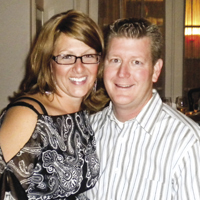
“[There’s] no better way to learn to live in a community than living with the same people for three months,” says Tanya Charles Shenk ’93, a nurse in Harrisonburg, Virginia.
Joelle Hackney ’07, MA ’10 (conflict transformation), still treasures the relationships she built with her classmates on the trip, “most of whom remain dear, lifelong friends.”
“It has been almost 10 years since my trip and I still feel a deep connection to that part of the world,” says Rebekah Kratz Brubaker ’04, a social worker in Harrisonburg. “I find myself listening more intently when I hear news on the radio or television related to the Palestinian and Israeli conflict.”
Ben Stauffer ’01 says his reading choices reflect his Middle East sojourn. “I was going through some books in the last month and found Elias Chacour’s Blood Brothersand started to read it again. Many things I saw and learned about came back to me as I was reading. The people and issues of the Middle East will always have a special place in my heart.”
4. Grasping the complexity of multiple viewpoints in conflicts.
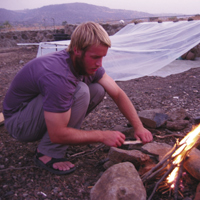
“[The cross-cultural] really opened my perspective on the world’s complex issues such as the Palestinian-Israeli conflict,” says Ben Stauffer ’01, of North Lawrence, New York.
Jill Stoltzfus ’91 agrees: “From visiting an utterly miserable refugee camp in the Gaza strip to attending a Shabbat dinner at the home of a strongly pro-Israel Jewish family … I learned for the first time in my life how something can be viewed so differently depending on who’s doing the viewing.” Stoltzfus is now the director of the research institute at St. Luke’s University Health Network in Bethlehem, Pennsylvania.
David Landis ’04, co-founder of the Jesus Trail in Israel, says his cross-cultural experience made clear the importance of “determining context within situations that seem black and white.” (Read how he developed a career jumping from his cross-cultural.)
5. Becoming passionate about cross-cultural exchange.
“I learned how to be passionate about the world and its people. Before cross-cultural I knew little about the rest of the world and even less about the Middle East,” says Ruth Ellen Dandurand ’10. “I recognize the world now as one divided community that is in dire need of the love of Jesus to make it whole again.”
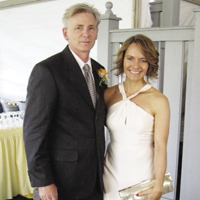
“[For me], the trip solidified the value of cross-cultural education, and that’s inspired us to stay involved,” says Anna Dintaman ’05 Landis, who helped develop the Jesus Trail with her husband, David, after her experience as a student on the cross-cultural in 2004. The two have since hosted recent EMU student groups on the 40-mile trail in Galilee and co-authored Hiking the Jesus Trail.
At times, the trip has also given participants a taste of the intolerance that persists in the Middle East, says Jill Stoltzfus ’91, whose heritage is Jewish on her mother’s side. “The fact that some Palestinian kids threw stones at me while I was walking in Old City Jerusalem one afternoon hammered home my Jewishness in a way nothing else did while I was in the Middle East. I experienced, if only briefly, what it must feel like to be hated so intensely by an entire group of people.”
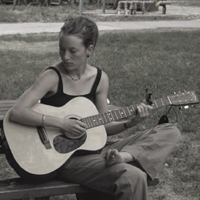
The diversity of the people she encountered in the Middle East left a deep impression on Joelle Hackney ’07, MA ’10 (conflict transformation). Ones that stand out in her mind include a doctor’s assistant at the clinic who cared for her during an illness; a Palestinian woman left mute after her home had been destroyed four times; a young Israeli sniper, recently released from service and shaken by his experiences; the Israeli woman who reminded her of her mother and had lost her son in a bus bombing; the teenage Palestinian, born and raised in a refugee camp, dreaming of his grandparents’ land he had never seen; the man at the falafel stand who told her, almost at the point of tears, “Thank you so much for being here. Please, when you go home, tell the people in your country, tell your Mr. Bush, what is happening here.”
While attached to an IV in a Palestinian clinic when she was sick, a doctor told Hackney something that has remained with her since: Don’t be too quick to judge people.
“I had a hard time understanding exactly what he meant, until later in the cross-cultural,” she says. Then she met a rabbi who offered similar advice: Be careful to not make either side a victim or an aggressor in your mind.
“I began to see how desperately those working for peace, for a different way, were trying to break out of systemic identities of victimhood, persecution, and violence, imposed upon them by the outside world and also from within their own cultures,” Hackney continues. “They were desperately seeking an opportunity to re-narrate their own futures, to break a cycle of justification for violence and for hatred of ‘the Other.’” Hackney is the program coordinator at the Staunton (Va.) Creative Community Fund.
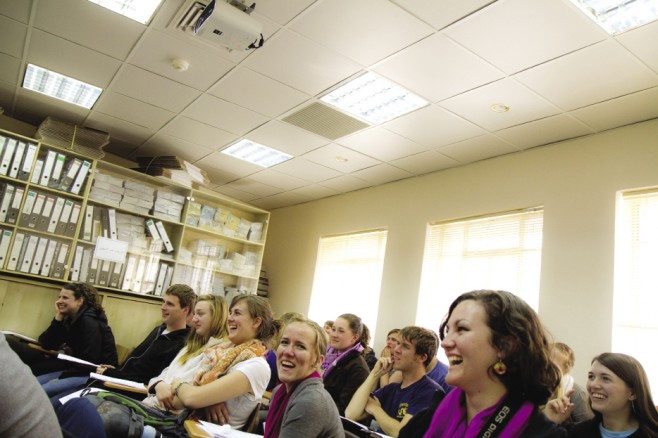
6. Shifting direction in life and career.
After finishing his studies at EMU, Rus Pyle ’03 entered the mental health field and now is a licensed mental health counselor in Albuquerque, New Mexico. Pyle works with an agency that uses meditation to address emotional conflict and addictive behavior.
“We work with an underserved and often ignored population: ex-offenders on probation and parole,” Pyle says. “This integration of spirituality, existentialism, application, and service to a marginalized community, all began while on the cross-cultural, and studying at EMU. Time and time again, I have looked back on the understandings and goals [that] began during my time in the Middle East not only with a sense of fondness, but a with a sense that my studies at EMU could not have been complete without them.
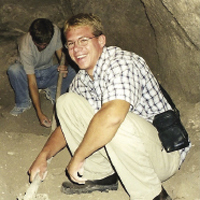
Ben Stauffer ’01, now working on his family’s dairy farm in New York, traces his decision to volunteer with Mennonite Central Committee (MCC) to his cross-cultural. “I realized how rich we are here in the U.S. and I was definitely uncomfortable with that,” he says. “I [went] to Brazil for three years to help build cisterns for catching rain water.”
Ruth Ellen Dandurand ’10’s desire to do long-term missionary work intensified during her experience in the Middle East. “Over the last two years, I have continually asked Him for the opportunity to use me somewhere else in the world. And in January the ball started rolling for a year of missionary service in Guinea-Bissau through Eastern Mennonite Missions that, Lord willing, will start in August, 2012. So far there has been a great deal of peace and answers to prayers as He leads me on this incredible journey that began as a child and took form during my experience in the Middle East.”
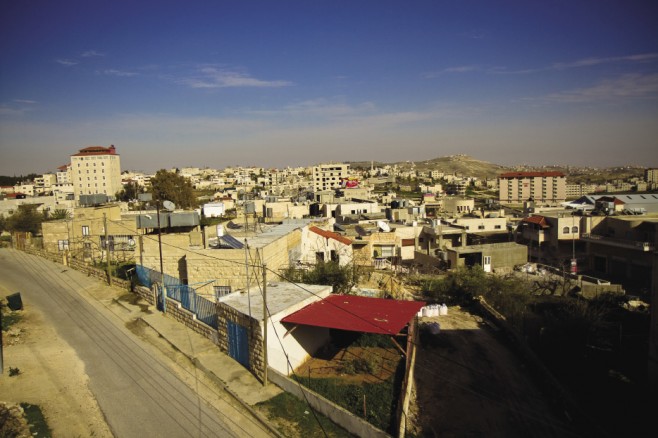
“I can trace my time with MCC back to that experience [on cross-cultural],” says Ed Nyce ’86, who worked for the organization in Bethlehem and Amman, Jordan, from 1999 to 2007. Several MCC volunteers in the region when he was a student played a significant role in his trip, he says. Nyce later helped facilitate trips for the EMU cross-culturals that happened while he was with MCC.
“My EMU cross-cultural semester, other EMU courses, additional work and study experiences, and MCC assignments have all combined with other factors to help shape my worldview, and led to the many questions that are always banging around inside of me,” Nyce says. “What does it mean to love neighbor and enemy, or two neighbors, when what is experienced as love by one is not automatically understood as love by the other? How does one succeed in standing with that person or group who is disempowered, perhaps especially when my own country plays a significant role in the conflict as it does there, without standing against the humanity of the one in power, yet also without dropping the ball on the need to address real power issues?”
— By Andrew Jenner ’04. Read about his conflicted reactions to his 2002 Middle East cross-cultural.
